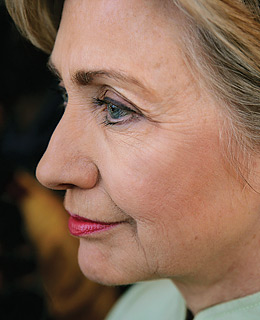
Hillary Clinton
It seems there is no aspect of Hillary Clinton's life—public or private—that won't start an argument: from her hairstyles to her health-care plan, from the vote for the Iraq war to the decision to stay with her philandering husband. And yet, as she campaigns in places like Iowa and New Hampshire, the first woman to have a serious shot at winning the White House often introduces herself this way: "I may be the most famous woman you don't really know."
Whether what we know of Clinton, 59, is impression or reality, it gives her both an advantage and a burden unlike that of any other candidate. Her gender is the least of it. As a First Lady and then as a Senator from New York, she has always been a more moderate and pragmatic politician than either her admirers or her detractors believed. Her 2008 campaign strategy is a reverse image of the liberal stereotype, one that has its eye on the November election. But in retooling her image so she can be acceptable to moderate voters in swing states, she risks finding herself at odds with an angry Democratic primary electorate that has not forgiven her vote on Iraq.
Then there is the question of her famous name and all that it evokes. It sets her at the head of the pack in nearly every poll. For all the drama and controversy, most Americans have pretty good memories of the prosperity and peace of the Clinton years. But does that mean they want eight more of them? And after two Bush presidencies, are they ready for another dynasty?
Clinton insists that voters will ultimately discover who she is. "I will answer people's questions. I will make them feel comfortable and open to me," she told me after her first campaign swing through Iowa, in January. "And hopefully, get a positive response. You know, I know I have to earn every vote. None of that worries me."